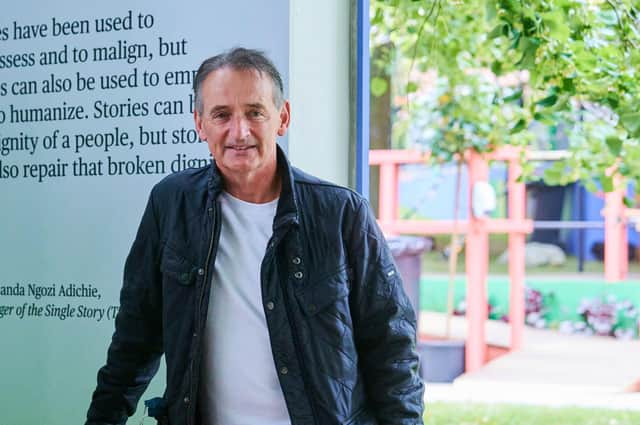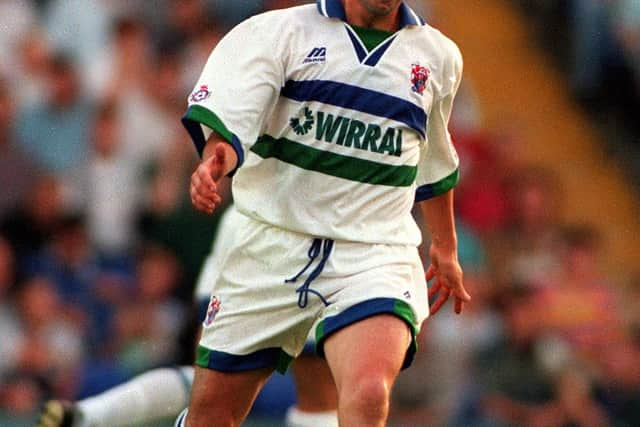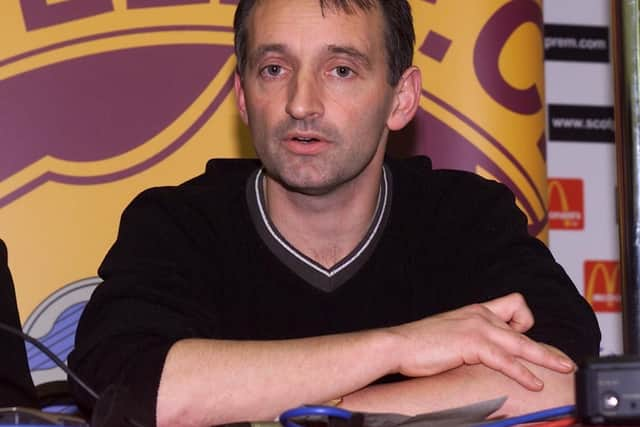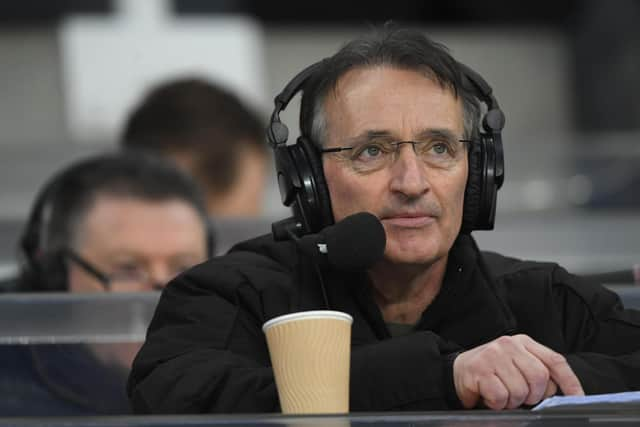Pat Nevin glad he turned down Celtic as he reveals how Hibs have helped his son cope with autism


He was recently asked to host a reunion at Chelsea involving the 1983-84 squad he was an integral member of. Perhaps they entertained each other with the alternative-career game on that occasion. "As in what clubs might they have played for but, for whatever reason, didn't," he says. "I was Clyde, Chelsea and all the rest, but it could’ve easily been Dundee United, PSG, Gala….."
Gala might be a reference to Turkish giants Galatasaray or it may even be Gala Fairydean, which for over 20 years have been one of his local clubs after moving with his family to the Scottish Borders, where his wife Annabel grew up.
Advertisement
Hide AdAdvertisement
Hide AdIn his first autobiography published in 2021, he writes about the opportunity he had to head to Turkey while at Everton. Instead, he took a ferry across the Mersey to join Tranmere Rovers, which is where the second and arguably most interesting volume of his memoirs, published this month, begins.


Perhaps surprisingly, Prenton Park is where he says he played the best football of his career. Tranmere are also where he earned the majority of his 28 Scotland caps.
But there were still forks in the road and paths not taken. Most notably, there was the time he – unwittingly – rejected Celtic, his boyhood team. It was, he estimates, the fourth and last time he had the chance to sign for a club where his style of play, which owed such a lot to Jimmy Johnstone, would surely have been appreciated.
But he kyboshed it himself after presuming, wrongly it turned out, that Bolton Wanderers, Tranmere’s arch-rivals, were the team involved when manager John King informed him of a bid.
Nevin had already been tipped off about their interest and although tempted – more money, a chance to return to the English top flight – he concluded that he was happy where he was, and, as chairman of the PFA, felt duty bound to honour the contract he had signed for Tranmere. He told King as much. And then, as he exited his office, put his head back through the door to ask with as much affected sincerity as possible the identity of the club who’d wanted to sign him.


“Celtic,” said King. Ah. “Oh my God, what had I done?” writes Nevin. “Celtic were the team I supported, and I had just turned them down without realising it.”
There was no way he could recant after the spiel he had just given the manager about how much he loved it at Tranmere, which was at least true. He resolved to push the frustration to the back of his mind and get on with trying to win promotion to the Premier League with his current club. If he was going to feel any anguish, he reasoned, it would have to wait until the end of his career.
And so, sitting in a book shop cafe in Glasgow, an obvious question to ask the long retired accidental footballer is: does he regret it now? Does he wish his alternative career had involved wearing the hoops?
Advertisement
Hide AdAdvertisement
Hide Ad“It would have pleased my Dad," he says. "But here’s the hard bit – I am happy now it did not happen."


Being able to sit and speak uninterrupted in a Glasgow city centre venue for over an hour might be a factor in this assessment. "Life living in Scotland as a former Celtic or Rangers player is different," he says. "Although it would have been fabulous at the time - I would’ve loved just walking out there once with the hoops - now trying to live with that would be difficult.
"I like to be as anonymous as I can be walking through the streets," he continues. "That’s a wee bit harder (if you've played for Rangers or Celtic). And then there’s all the vitriol, the sectarianism, which as we all know I cannot cope with whatsoever. I rail against it too much.
"There’s a group of Celtic fans who are unimpressed with me as it is. Had I been one of their old players being as outspoken as I am, it might have been a lot worse.”
Nevin’s career amounts to much more than Not Playing for Celtic. It’s produced two volumes of memoirs already - and another is on the way, though he's stopping the current Barbara Cartland-rate of delivery.
"I have held back a bit, I need a rest," he says. The next one will be more travel orientated and focus on his post-playing career media work, but there will be a pause before it hits the shelves.
One imagines he needs time to digest the reaction to the latest book. There's a lot of pain and conflict as he reflects on the draining period spent playing for Motherwell while effectively running a club sliding inexorably towards bankruptcy. He kept his hand firmly down at a boardroom vote to put the club into administration, "the only naysayer right to the end".
But the greatest emotional heft does not involve football directly, though the game - and a particular club - do play a significant part in the journey following his son Simon's autism diagnosis in the mid-1990s. Now 32, Simon has dealt admirably with the challenges, as have Nevin, Annabel and recently engaged daughter Lucy, a GP.
Advertisement
Hide AdAdvertisement
Hide AdNevin does recount a moment of crisis which saw him sink to his knees while bathing Simon after he was ambushed by a tumult of dark thoughts: would they ever watch a football match together, would Simon ever drive a car, have a job? Happily, the answer to all these questions is yes, which is where Hibernian FC enter the story.
In his latest book, he writes that Hibs had always been “my other Scottish club anyway,” so when the 12-year-old Simon showed an interest in going to a game, Easter Road seemed an obvious and reasonably handy – from Duns – choice of destination. There were also “none of the religious and sectarian undertones that existed at the big Glasgow clubs”, something, he says, he could not conceive of introducing Simon to. “As I got older my tolerance levels for that sort of stuff had plummeted,” he notes.
A 3-2 win over Dundee United, courtesy of a 90th minute winner, sealed the deal for Nevin and son, with the father having the bonus of sitting alongside like-minded fellow supporters, who were able to discuss the relative merits of the Fire Engines and Orange Juice. “Clearly I was home too,” he writes.
“That first game was magic,” he says now. “The way Simon has been accepted. He was at the Player of the Year do the other night. He is a season ticket holder now, he goes on his own. People treat him fabulously.” Like his father, Simon is a huge music fan, and heads to gigs whenever he can, including Bruce Springsteen's epic turn at Murrayfield recently.
"He recently spent two nights on his own for the first time," continues Nevin, who is 60 in September. "He lives with us and always will, as long as we are around. But we won’t always be around."
Simon’s independence has been improved by not only passing his driving test, but becoming a driver for local school children, some of whom have special educational needs themselves. Hero is an overused term in football, and music, but Nevin has legitimate reason to be in awe of Simon.
He knows there’s been a cost, but rarely rages. “It hit me that night, sitting in the bathroom, when I have a clear memory of contemplating all the things that would not now happen,” says Nevin. “But I have learned so much from Simon. Not just his autism. Different ways of looking at life. There is no point raging. How dare I!? I don’t have to deal with those problems. So, rage, no. I still knew we were fortunate.
"It came down to something very simple," he continues. "He had been brought to us. We had to take care of him. Anything else was just completely secondary.
Advertisement
Hide AdAdvertisement
Hide Ad"Now and again, Annabel and I talk about things we would have done. We would have lived in Edinburgh, we would not have lived in the Borders. We chose there because that sort of community is better. As I often say, it’s very handy for nothing! But I do love it there. I have grown to love it.”
The surroundings suit Simon but there are always challenges. "It's hard to make friends for autistic people," explains Nevin. "Simon is outgoing but people move on. They get married, have children. They go another way. Simon is still there. So Hibs and the music gives him that belonging he needs outwith the family. I cannot say how much it has helped him and me. When we go to games together, I am sitting quietly. I want the team to win of course. But Simon is fanatical!"
As any football fan can attest, passion sometimes overspills. Nevin was driving out of Liverpool after completing some punditry duties when he received a call from his wife: Simon’s been arrested!
"Hibs were playing at Tynecastle in a semi-final, Hibs scored and Simon ran on the pitch," recalls Nevin.
He wasn’t the only one. But, while everyone else quickly dispersed, Simon lingered and was collared. Fortunately, someone was able to explain the mitigating circumstances.
“He was actually kicked out, not arrested,” says Nevin. “It was a valuable lesson. He didn’t go on the pitch again until Hampden in 2016 – when everyone went on the pitch!” Nevin found himself in the slightly awkward position of tut-tutting on radio as Hibs fans swarmed on after the Scottish Cup win over Rangers while knowing it was very likely his own son was among the throng.
Uncomfortable situations were part of his daily routine while at Motherwell, the chapter in his career arguably providing the most drama and which forms the backbone of Football And How to Survive It, his latest memoir.
The Fir Park club represented a “four-year maelstrom” after the Indian summer he had enjoyed with Kilmarnock, where, for the first time, football’s original outsider says he felt completely at home in the dressing room.
Advertisement
Hide AdAdvertisement
Hide AdAt Motherwell, it was a bit different - and not because he was reading NME and listening to the Cocteau Twins. Once an anti-authority figure, he was deemed a little bit too 'executive class' for his fellow players’ liking. Nevin, in his unique CEO-player capacity, was left to try and steer a path between continuing playing while also being manager Billy Davies’ boss. It’s little wonder Davies felt paranoid.
“I don’t know what Billy will think (about the book),” says Nevin. “There’s one word that’s often used to describe him, beginning with a P. I use the word once. It was understandable to be paranoid because they (managers) all do get sacked eventually.
"He was a young manager, different from me. I had a different education so I was protective of him, as much as I could be. And beneath it all, he was a good coach when he had the money.”
The trouble was, he ultimately didn’t have the budget. Not the one he was promised, at least. Players such as John Spencer were brought in on large salaries and then told there was no money to pay them. It seemed Nevin had been hoodwinked to an extent by owner John Boyle, although there's no residual bitterness. “I’d be vaguely interested to speak to John, we’ve had one conversation (since),” he says. “There’s no need for me to do it really. But if he said, ‘You want to go out for dinner or a drink, have a chat?’, I’d be like ‘Ok’, because we always got on pretty well.”
He has met Davies just once since sacking him, at a gig, when there was understandable coolness. Nevin outlines how he had Davies' back until there was no choice but to part company, after taking just three points from 21 at the start of the 2001-02 season.
"There were all these stories that Billy was my puppet and I used to think ‘you’ll find out eventually how it is’," says Nevin. "There was no chance he was going to let anyone manipulate him. I think I only made about eleven starts as a player (under him). If I was manipulating him, I wasn’t very good at it.
“I came up with one player. Right at the start I asked him to buy Ged Brannan, that was the only one. He said: ‘I will take your word on that, and that’s it’. He (Brannan) became skipper and played every game."
Nevin’s appearances were rather more sporadic, despite his position of power. His playing career fizzled out slightly, which seems a shame. After all, there are many football fans who have never supported one of Nevin's former clubs who still regard him as their favourite player.
Advertisement
Hide AdAdvertisement
Hide AdHis final top-class game at least produced a win, against Rangers no less, at the end of the 1999-2000 season. He came on as sub. “Last ever game. Oh well,” is how it’s recorded in his diary.
"Like Paxman when he walked away from University Challenge, 'I will be watching next year…goodbye'. That’s how I wanted to walk away from my career,” he says.
"My father-in-law - a lovely, lovely man - retired from being a doctor. He was loved by the local community. But he said: ‘Look, I don’t want to make a big deal about this’.
"He described it as being like you are at the window and can see a deer in the woods, and it’s dusk. You look again and it is still there. The next time, it's getting darker, you think you can see it, and then suddenly, you can’t see it. He wanted to fade away like that. No big farewells, no goodbyes.”
That’s the way Nevin treated it. He was annoyed when Boyle insisted on a tribute in the match programme. "My joys, my rewards were all during my career," he says. "There didn't need to be anything else.”
Football And How To Survive It by Pat Nevin published by Octopus, £22
Comments
Want to join the conversation? Please or to comment on this article.